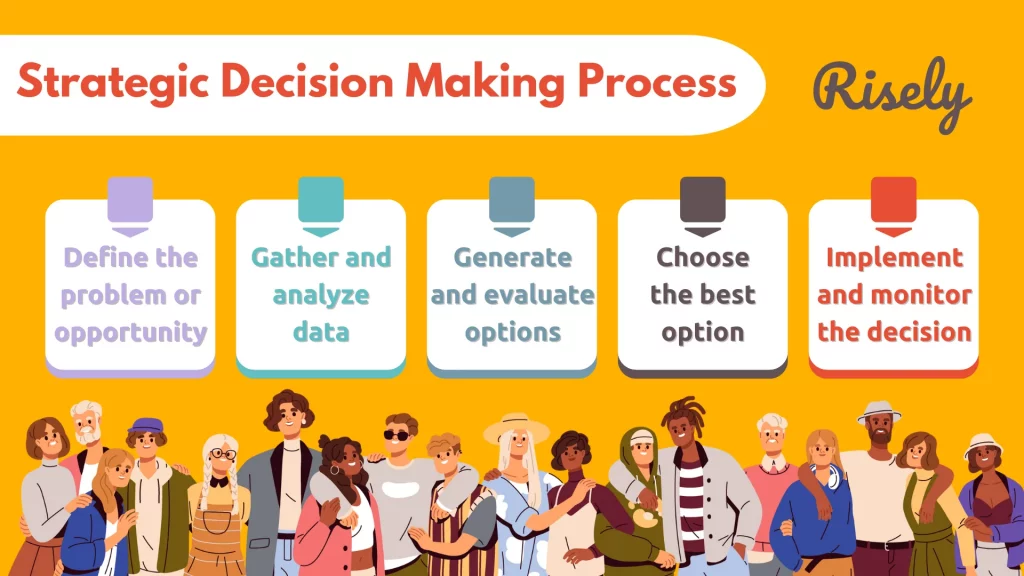What is Strategic Decision Making?
Strategic decision-making refers to choosing the best course of action to achieve an organization’s long-term goal or objective. It is a deliberate approach to decision making that considers the big picture, the organization’s strengths and weaknesses, and the impact the decision will have on its future success. Strategic decision making involves considering multiple options and weighing the potential outcomes before choosing the most appropriate solution. It requires a clear understanding of the organization’s overall strategy and goals and an evaluation of external factors such as market trends and competitor analysis. The ultimate goal of strategic decision-making is to make decisions that support the long-term success and competitiveness of the organization. This requires careful consideration, planning, collaboration, and input from multiple stakeholders within the organization. Read more: Decision making for managers: How to improve your skills?What is “strategic”? The term “strategic” refers to something done or thought out as part of a long-term plan or a comprehensive approach to achieving a goal or objective. In the context of business and organizations, “strategic” often refers to decisions and actions taken at the highest levels of management to shape the future direction and success of the organization.
Strategic thinking involves:- Considering the big picture.
- Understanding the organization’s strengths and weaknesses.
- Anticipating and planning for future challenges and opportunities.
Examples of Strategic Decision Making for Managers
- Mergers and Acquisitions: Deciding whether to merge with or acquire another company is a prime example of strategic decision making. This type of decision can have significant implications for the organization’s future and requires careful consideration of multiple factors, including market trends, the financial performance of the target company, and the impact on employees and customers.
- Resource Allocation: Allocating resources, such as financial capital and personnel, is a typical example of strategic decision making in the workplace. This requires weighing the costs and benefits of different options and making decisions that support the organization’s long-term success.
- Market Expansion: Deciding whether to expand into new markets is another example of strategic decision making. This requires evaluating the potential benefits and risks of entering new markets, including the competition and the impact on existing operations.
- Product Development: Developing new products or services is a crucial component of strategic decision making in many organizations. This requires considering multiple factors, including market trends, customer needs, and the financial implications of product development.
- Organizational Restructuring: Deciding to restructure the organization by downsizing or outsourcing certain functions is a complex and significant example of strategic decision making. This requires careful consideration of the impact on employees, customers, and the organization’s overall operations.
Importance of Strategic Decisions for Managers
- Aligns with organizational goals: Strategic decision making helps to align decisions with the overall goals and objectives of the organization, ensuring that resources are being used effectively and efficiently to achieve long-term success.
- Supports competitiveness: Strategic decision making enables organizations to stay ahead of the competition and maintain a competitive advantage by making informed decisions that support growth and success.
- Promotes long-term thinking: By considering the long-term implications of a decision, strategic decision making promotes a forward-thinking perspective that supports sustainable growth and success.
- Improves decision quality: The process of strategic decision making helps to ensure that decisions are based on accurate and up-to-date information, leading to better quality decisions and improved outcomes.
- Supports collaboration: The process of strategic decision-making often involves input from multiple stakeholders within the organization, promoting collaboration and a sense of shared ownership of the decision by the team. This can lead to improved buy-in and a more significant commitment to implementation.
Process for Strategic Decisions Making
The process of strategic decision-making typically involves several key steps:- Define the problem or opportunity: Clearly articulate the decision that needs to be made and the goal that it is intended to achieve. Here, it is crucial to clearly define the problem or opportunity to focus the decision-making process. Gathering and analyzing data.
- Gather and analyze data: Collect and evaluate relevant information, such as market trends, competitor analysis, and organizational capabilities, to inform the decision making process. It helps to inform the decision making process by providing information on market trends, competitor analysis, and organizational capabilities.
- Generate and evaluate options: Develop and consider multiple solutions to the problem or opportunity. This allows for developing and considering multiple potential solutions to the problem or opportunity.
- Choose the best option: The solution most likely to achieve the goal aligns with the organization’s overall strategy. In choosing the best option, it is crucial to select a solution most likely to achieve the goal and align with the organization’s overall strategy.
- Implement and monitor the decision: Put the chosen solution into action and track its effectiveness over time. It involves putting the chosen solution into action and tracking its effectiveness over time to ensure it achieves the desired results.

How to make more strategic decisions?
Here are several vital steps that managers can take to improve their strategic decision making:- Establish a clear decision-making framework: A clear and well-defined framework for making decisions can help ensure that decisions are made consistently and effectively. This may include defining the criteria for making decisions, identifying stakeholders who need to be involved, and establishing a timeline for making decisions.
- Gather and analyze data: Managers should gather and analyze relevant data to inform their decisions. This can include market trends, competitor analysis, and internal data on organizational performance.
- Engage with stakeholders: Engaging with stakeholders, including employees, customers, and suppliers, can help to gather valuable insights and perspectives that can inform strategic decision making.
- Consider multiple options: Managers should consider various options before deciding. This helps ensure that the best possible solution is selected and that unintended consequences are identified and addressed.
- Make decisions based on a long-term perspective: Managers should make decisions based on a long-term perspective, considering the impact that a decision may have on the organization in the future.
- Continuously monitor and evaluate decisions: Once a decision has been made, managers should continuously monitor and assess its effectiveness and make adjustments as necessary.
By following these steps, managers can work towards making better strategic decisions that support their organizations’ long-term success and competitiveness. However, it is essential to remember that strategic decisions are ongoing and that managers should continually seek to improve their decision-making approach.
Read more about the key role of strategic thinking in leadership here: Decoding Strategic Thinking in Leadership: 5 Ways to DevelopConclusion
In conclusion, strategic decision-making is crucial to effective leadership and management. By understanding the importance of this process, managers can develop the skills they need to make informed and effective decisions that drive the success of their organization. Whether you’re dealing with market expansion, resource allocation, or organizational restructuring, having a clear understanding of the strategic decision-making process and the factors that impact its success can help you make better decisions and achieve your goals. By exploring the critical elements of strategic decision making and the steps managers can take to improve their skills, this blog provides valuable insights and guidance for anyone looking to enhance their abilities in this vital area. So, whether you’re a seasoned manager or just starting your career, be sure to take the time to develop your understanding of strategic decision making and take your skills to the next level.Are poor decisions holding your team back?
Take the free decision-making assessment to understand your weak areas






